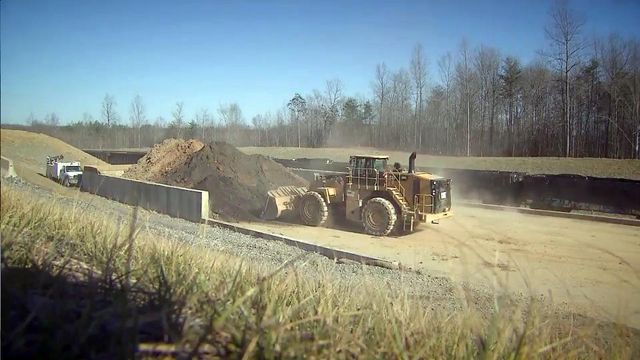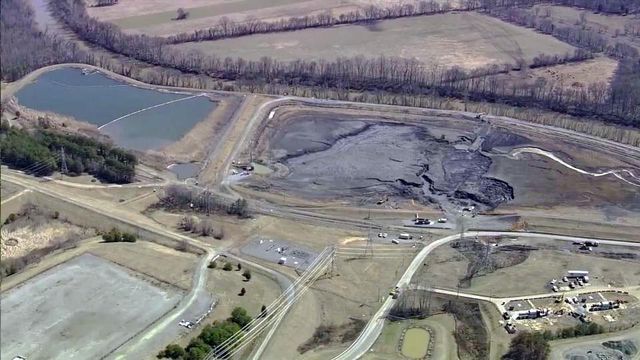NC regulators may force Duke to remove all coal ash dumps
North Carolina regulators say Duke Energy must dig up and close all of the more than 30 coal ash basins scattered across the state within the next eight years because of the risk they pose to the public and the environment, but they're asking state lawmakers to allow for the review of that plan within 18 months.
Posted — UpdatedThe Department of Environmental Quality was tasked under the 2014 coal ash law to prioritize clean-up of the dump sites containing the material, the byproduct of coal-fired energy production. Regulators classified eight of the basins as high risk and the remainder as intermediate risk, requiring the excavation and closure of the sites by the end of 2019 and 2024, respectively.
DEQ regulators based their rankings on the potential impacts of groundwater and surface water, as well as the safety of dams holding the slurry of coal ash and water in place.
But in a press release Wednesday morning, DEQ Secretary Donald van der Vaart said deadlines in the coal ash law are "too compressed" to allow for changing information, such as ongoing repairs to dams or plans to provide alternative water sources to nearby well owners. That's why he said the agency is pushing for the General Assembly to allow the review of the classifications in a year-and-a-half.
"The focus of the coal ash law was to safely close all coal ash ponds in North Carolina,” van der Vaart said. "The intent was not to set pond closure deadlines based on incomplete information. Making decisions based on incomplete information could lead to the expenditure of billions of dollars when spending millions now would provide equal or better protection."
Re-evaluating the risk levels could allow regulators to deem some ponds low risk, which would extend the closing deadline to 2029 and allow the coal ash to be covered and left in place instead of dug up and removed.
Duke CEO: excavation 'the most extreme option'
"If the state chooses to allow these rankings to stand without the benefit of additional information and additional work, then North Carolina will have chosen the most extreme option to close the ash basins, an option that will cost our customers more money, impact our communities for a very long time and result in no real environmental benefit," Good said in the statement.
The company said it will push for clarifications to the coal ash law within 60 days, after which DEQ's proposed recommendations will become final. But on a conference call with reporters Wednesday afternoon, Good wouldn't provide specifics on what changes the company would like to see, saying only the law needed more flexibility to incorporate new information such as dam repairs.
That work may be finished within the next six months, she said.
Good also told reporters the company disagreed with DEQ's position that a legislative change was needed to review the classifications in 18 months.
"We believe DEQ can reassess as they do with existing regulations," Good said.
If the coal ash ponds classified as intermediate risk aren't reduced, which would give the company the option to cap in place, Good said the risk of not meeting the 2024 deadline for cleanup was "signficant." The company has maintained that draining the unlined pits of water and covering them with a liner and vegetation would save money and protect the environment as well as excavation.
"Today’s classifications are a testimony to the persistence of committed and engaged communities advocating for safe drinking water," Emma Greenbaum, an organizer for for the Sierra Club’s Beyond Coal campaign in North Carolina, said in a statement. "While today’s announcement represents a significant step forward, families living near coal ash ponds will continue to face uncertainty about their drinking water until the coal ash is removed and stored away from water sources."
But North Carolina Sierra Club State Director Molly Diggins said she was concerned by the request to review the classifications, which she said could lead to "unilateral decision making."
"It’s unclear what oversight or public input there will be if these classifications can be revisited immediately before the deadline for closure plans," Diggins said. "This is exactly what the legislature sought to avoid when drafting the Coal Ash Management Act."
Attorneys with the Southern Environmental Law Center, which is suing Duke over coal ash cleanup, also criticized the move, arguing that state lawmakers wanted environmental regulators to assess the risks of the basins as they exist today, rather than in 18 months.
SELC attorney Frank Holleman said the move is part of a pattern of a unnecessary delay by the environmental agency, which has been regulating the coal ash basins for decades and should have all the information it needs to move ahead.
"This is Duke Energy finally being held accountable," SELC attorney Frank Holleman said. "Yet what DEQ wants to do is give them another extension, find another way to let them get off the hook and leave our groundwater, our rivers polluted forever by Duke Energy's unlined coal ash storage."
Officials with DEQ said no one for the agency was available for an on-camera interview Wednesday.
Four of those ponds at the time were deemed low risk, and about a third were designated low to intermediate risk while regulators waited on more information from Duke.
Duke exploring alternative water sources for well owners
The last several years have seen renewed attention in coal ash after a busted stormwater pipe spilled tons of the heavy metal-laced material into the Dan River near Eden in February 2014.
In addition to requiring a plan to cleanup and close statewide coal ash basins, the legislation that followed the Dan River spill required state officials to test well water for residents living near the ponds and to determine if any contamination was the result of coal ash pollution.
While agency regulators are still trying to answer that question, tests have shown elevated concentrations of contaminants in hundreds of wells, leading state health officials to advise in 2015 homeowners not to use the water for drinking and cooking. Since then, they've been drinking bottled water supplied by Duke Energy.
In its release, DEQ maintained residents' well water "meets federal requirements for safe drinking water," but noted that the energy company is evaluating supplying well owners with "permanent alternative water."
Asking the legislature for the ability to redo the classifications next year, environmental groups say, will likely force residents to wait longer for solutions.
"There are loopholes here that allow Duke to just kick the can down the road as far as cleanup goes," Sam Perkins, Catawba Riverkeeper, said in a statement. "There are hundreds of families across the state still living with contaminated water and have no idea when their communities will actually be cleaned up."
Related Topics
• Credits
Copyright 2024 by Capitol Broadcasting Company. All rights reserved. This material may not be published, broadcast, rewritten or redistributed.






